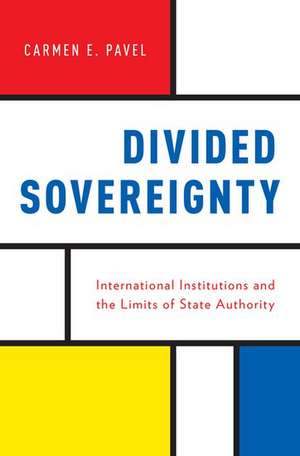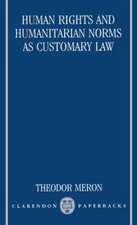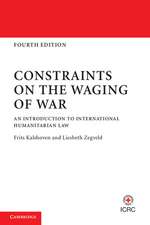Divided Sovereignty: International Institutions and the Limits of State Authority
Autor Carmen Pavelen Limba Engleză Paperback – 27 iul 2017
| Toate formatele și edițiile | Preț | Express |
|---|---|---|
| Paperback (1) | 214.02 lei 31-37 zile | |
| Oxford University Press – 27 iul 2017 | 214.02 lei 31-37 zile | |
| Hardback (1) | 611.86 lei 31-37 zile | |
| Oxford University Press – 11 dec 2014 | 611.86 lei 31-37 zile |
Preț: 214.02 lei
Preț vechi: 249.39 lei
-14% Nou
Puncte Express: 321
Preț estimativ în valută:
40.96€ • 42.55$ • 34.02£
40.96€ • 42.55$ • 34.02£
Carte tipărită la comandă
Livrare economică 22-28 ianuarie 25
Preluare comenzi: 021 569.72.76
Specificații
ISBN-13: 9780190692179
ISBN-10: 0190692170
Pagini: 242
Dimensiuni: 155 x 231 x 15 mm
Greutate: 0.34 kg
Editura: Oxford University Press
Colecția OUP USA
Locul publicării:New York, United States
ISBN-10: 0190692170
Pagini: 242
Dimensiuni: 155 x 231 x 15 mm
Greutate: 0.34 kg
Editura: Oxford University Press
Colecția OUP USA
Locul publicării:New York, United States
Recenzii
Divided Sovereignty is a lucid piece of work that makes a coherent argument in favor of a pluralist conception of multilateral institutions, which would serve as the agents of peoples and, as a last result, protect peoples against fundamental violations of human rights.
Pavel provides a systematic and thoughtful account of the reasons why coercive international institutions are needed, the nature of their authority, and why individuals should support them and states should comply with their rules. Her book is a valuable contribution to the nascent shift in theorizing about global justice toward taking institutions seriously.
Divided Sovereignty makes a compelling case for supplementing sovereign states with coercive international institutions. Though it shares a concern for global justice, the book presents a powerful alternative to the institutional visions typically outlined by cosmopolitans. By prioritizing good institutional design over abstract morality, and defending the importance of collective self-determination, Pavel reorients recent debates. This is an original and important book.
Pavel provides a systematic and thoughtful account of the reasons why coercive international institutions are needed, the nature of their authority, and why individuals should support them and states should comply with their rules. Her book is a valuable contribution to the nascent shift in theorizing about global justice toward taking institutions seriously.
Divided Sovereignty makes a compelling case for supplementing sovereign states with coercive international institutions. Though it shares a concern for global justice, the book presents a powerful alternative to the institutional visions typically outlined by cosmopolitans. By prioritizing good institutional design over abstract morality, and defending the importance of collective self-determination, Pavel reorients recent debates. This is an original and important book.
Notă biografică
Carmen E. Pavel is a political theorist who specializes in contemporary political philosophy and the history of political thought. Her interests include liberal theory and contemporary challenges to it, ethics and public policy, international justice, the authority of international institutions, and environmental ethics. She is Lecturer in International Politics and Director of the BA in Philosophy, Politics, and Economics (PPE) Programme King's College London.















